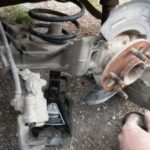Car repossession is a serious event, and it’s natural to feel overwhelmed if your vehicle has been taken away. You might be thinking that once the car is repossessed, your financial obligations are over. Unfortunately, this is often not the case. Even after your car is repossessed, you can still owe money on the car loan, and ignoring this debt can lead to significant financial repercussions. Understanding what happens if you don’t pay your car loan after repossession is crucial for protecting your financial future.
Deficiency Balance: The Debt That Lingers
When your car is repossessed, the lender will typically sell it at auction. However, the amount they get for the car at auction is often less than what you still owe on the loan. The difference between your outstanding loan balance (including repossession costs) and the sale price of the car is called a deficiency balance. This is the debt that you are still legally obligated to pay even after losing your vehicle.
Alt: Cars being auctioned off at a car auction lot, representing the sale of repossessed vehicles.
If you choose not to pay this deficiency balance, the lender has several avenues to pursue collecting the debt, which can severely impact your financial health.
Damage to Your Credit Score
One of the most immediate and significant consequences of not paying the deficiency balance is further damage to your credit score. The repossession itself already negatively impacts your credit, but failing to pay the remaining balance will compound this damage. The lender will likely report the unpaid debt to credit bureaus, resulting in negative entries on your credit report.
These negative marks can stay on your credit report for up to seven years, making it significantly harder and more expensive to:
- Get approved for future loans: This includes car loans, mortgages, personal loans, and even credit cards.
- Rent an apartment: Landlords often check credit scores as part of the application process.
- Get favorable insurance rates: Insurance companies use credit scores to determine premiums.
- Even get certain jobs: Some employers check credit scores as part of background checks.
Alt: A cracked screen showing a credit score interface, symbolizing the damage to credit score from unpaid debt after car repossession.
Legal Action and Wage Garnishment
Lenders are not likely to simply write off the deficiency balance. If you ignore their attempts to collect, they can take legal action against you to recover the money owed. This can involve filing a lawsuit to obtain a judgment against you.
If the lender wins the lawsuit, they can pursue various methods to collect the debt, including:
- Wage Garnishment: A court order can be issued to your employer to withhold a portion of your paycheck and send it directly to the lender until the debt is paid off. This can significantly reduce your take-home pay and make it difficult to manage your daily expenses.
- Bank Levy: The lender can obtain a court order to freeze your bank accounts and seize funds to cover the outstanding debt.
- Liens on Property: In some cases, the lender may be able to place a lien on other property you own, such as your home, which could eventually lead to further asset seizure to satisfy the debt.
Continued Debt Collection Efforts
Even without immediate legal action, the lender will likely continue to pursue debt collection. They may:
- Use internal collection departments: You will receive persistent phone calls and letters demanding payment.
- Sell the debt to a collection agency: Collection agencies are often more aggressive in their tactics and can be relentless in their pursuit of payment. Dealing with collection agencies can be stressful and damaging to your peace of mind.
Long-Term Financial Strain
Ignoring the deficiency balance doesn’t make it disappear. It can follow you for years, continuing to damage your credit and potentially leading to legal action. This ongoing financial strain can create significant stress and limit your financial opportunities for a long time.
What You Should Do
If you are facing a deficiency balance after car repossession, ignoring it is the worst thing you can do. Instead, take proactive steps:
- Understand Your Rights and the Deficiency Balance: Request a detailed accounting of the deficiency balance from your lender. Ensure all charges are legitimate and comply with your loan agreement and state laws.
- Communicate with Your Lender: Contact your lender to discuss your options. They might be willing to work out a payment plan or negotiate a settlement to reduce the amount owed.
- Seek Financial Advice: Consult with a credit counselor or financial advisor. They can help you understand your financial situation, create a budget, and develop a strategy for managing the debt and rebuilding your credit.
- Explore Legal Options: If you believe the repossession or deficiency balance calculation was handled improperly, consult with a lawyer specializing in consumer law to understand your legal options.
Ignoring a deficiency balance after car repossession will not make the problem go away. It will likely escalate the financial consequences and create long-term difficulties. Taking proactive steps to understand your obligations and communicate with your lender is crucial to mitigating the damage and working towards a financial recovery.


